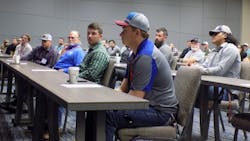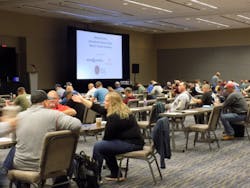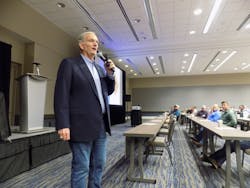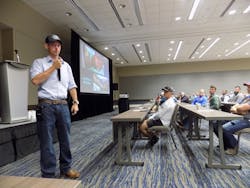In line work, safe work practices can mean the difference between a lineman going home at the end of the day or landing in the emergency room. To keep safety top of mind for the field workforce, the International Lineman’s Rodeo Association (ILRA) launched a safety conference to start off the 2021 Rodeo Week.
Due to travel restrictions and concerns surrounding the COVID-19 pandemic, international teams and some companies were not able to participate in the Lineman’s Rodeo. As a result, the ILRA opted to shorten the safety conference from a day-and-a-half to a half-day conference for 2021.
Line school students to experienced field supervisors attended the conference, which was sponsored by Burns & McDonnell, Safeguard and IBEW Locals 47, 66 and 304, to learn about safety in the electric utility industry.
Mike Stremel, training manager for Midwest Energy, says the Rodeo has been a great event for him to challenge himself and coworkers, meet with other utility workers across the country. He attended the safety conference to hear from Carl Potter, a safety speaker, as well as from an accident survivor.
“It’s great to hear the stories of people who have been in the industry and want to share their passion and dedication to the industry,” Stremel says. “They are promoting safety to the young people coming into the trade. It’s a great event, and it’s great to be back this year at the Rodeo.”
Evolution of Safety
Carl Potter, the founder of the Safety Institute and author of 12 books, started off his presentation by thanking the attendees for their dedication throughout the pandemic.
“Our operating centers were like ghost towns during the pandemic, but workers were taking the bull by the horns and stepping it up,” he says. “This is the cream of the crop, and this is where you come to find out how you can be better at what you do.”
With his 17 years of front-line experience in the utility industry, Potter drove the importance of safety home for the attendees. He says linemen need to change their attitude and personal culture about safety.
“When something happens, and one of us screws up, you may think it is someone else’s fault,” he says. “In reality you may have screwed up and failed to do something.”
Over the years, however, the line trade has become safer due to advances in personal protective equipment, he says. For example, more linemen are wearing 100 percent fall equipment when competing at the International Lineman’s Rodeo.
“You can do your job just as effectively with safety equipment if it is done right,” Potter says. “If everything else goes bad, hopefully the PPE will save your life.”
As the linemen of yesterday evolved from wearing fedoras to hard hats and riding horses or using bucket trucks, they have continued to improve their safe work practices.
“Do you know how hard it was for linemen to give up fedoras for hard hats?” Potter asked the crowd. “Like farmers, they just got it done. Today, however, we know that if you do this job long enough, something will happen. Every time you go out to do a job, you flip the coin and roll the dice anew. If you don’t wipe the slate clean and look at your job today and test your equipment, all bets are off.”
The past safety goals for organizations were to keep injuries below common injury rates and reduce the number of injuries from the year before. It can be like a catch 22 for many utilities, however, he says.
“We get better, then something happens, and we look back,” he says. “There has got to be a goal where we all work together—the IBEW, management and rank and file. Everyone has to understand what the culture is.”
Regardless of the demands of work, linemen must be expected to take time to do it safely, he urged the audience.
“Fate is the hunter that seeks those who are least prepared,” he says. “Look at your crew. Stay safe in your work zone. Focus on job planning.”
For example, if linemen see an apprentice not following directions or being distracted, they should make sure the apprentice starts focusing so he or she can go home at the end of the day uninjured.
“Keep your eyes open,” Potter says. “Have your head on a swivel. Watch your coworkers and say stop, watch what you’re doing. If you see an unsafe condition, take action and then restart the safety clock.”
Potter advised the linemen to be proactive about safety by volunteering to participate in the safety committees or speak at a safety meeting.
“Stand in front of your peers,” Potter says. “You can make a statement and make some bold moves. If you have had at least eight years in the craft, you are a safety professional. Act like one.”
Also, he told them to not go outside their scope of work. For example, overhead linemen may not know how to do underground work, just as underground linemen may not climb poles.
“You can’t know it all,” he says.
Finally, he advised the attendees to check out all the personal protective equipment (PPE) at the Lineman’s Expo, which started immediately following the safety conference.
“Understand why you were proper PPE, and seek out more comfortable PPE,” he says. “We will get better and better.”
Sharing a Personal Injury Story
Following Potter’s presentation and a short networking break, Kent Brown, manager of safety for Evergy, introduced the final two speakers: Zachary and Mylinda Spicer.
At every Rodeo safety conference, a speaker shares a personal injury story, and 2021 was no exception. Zachary shared his story of how he survived an arc flash blast at a substation due to an improper lockout/tagout procedure. The last time he was in the substation, it was de-energized, and he took the door off the breaker and reached inside. On the day of his injury, however, he did not know it had been energized due to a backfeed.
“I was knocked out for about 10 seconds, and when I woke up, my first thought was that I was in a dream,” he recalled. “I have never been faced first in a substation in my life. I got up, walked all the way to the other side and looked down on saw the shredded skin hanging off my arm.”
He also saw, Barry, his coworker, behind him with all the skin on the lips and mouth off and no mustache.
“Barry got hurt because of something I missed,” he says. “I have apologized to that man a million times. He has a four-year- old granddaughter who he loves to take fishing. I came that close to letting that man die and taking him away from his granddaughter. There’s a responsibility so deep right there.”
Zachary, the father of four children, was life-flighted to a burn unit at a nearby hospital where he spent 22 days in treatment.
“I have broken bones, stitches and staples,” he says. “I thought I could handle pain. They told me the amount of medication to take the pain away would kill me.”
When he walked out of the substation house that afternoon, he wore his hard hat and rolled his flame-retardant, long-sleeve shirt up to his elbows. As he walked out the door, he left his safety glasses on the desk.
“When you expose contacts to 20,000 deg to 30,000 deg, they try to melt to your eyeballs,” he says. The doctor said, ‘Mr. Spicer, prepare to be blind. I was 35 years old with three girls and a little boy at home. I thought about seeing my kids that morning before they went to school, and I said, ‘That is the last time I will ever see them.’”
He said before the accident, he took his eyelids for granted. He had to have them reconstructed after the accident.
“I could not close my eyes, and my little girl didn’t know if I was sleeping or snoring with my eyes open,” he says. “You need to close your eyes and blink. I felt like someone poured sand in my eyes.”
In addition to possibly losing his eyesight, he also faced the need for the medical team to amputate his arm and the fingers of his left hand. Wearing his hard hat likely saved his life.
“When you are burnt, any inch of skin that is unburnt is a blessing,” he says. “I still have my hard hat, and it’s a little crispy.”
From that day on, he learned to record the full address of where he is working. That way, if an accident happens and he needs to make a 911 call, he can give the dispatchers the exact location and save critical time. Also, he learned the hard way that FR shirts should be worn as designed and not be rolled up at the sleeves.
“FR is worth its weight in gold,” he says.
When he was injured, he quickly discovered that the accident had a profound effect on not just him and his family, but also the community.
“When I got hurt, it was like throwing a rock into a pond, but the ripples were everyone else that was affected,” he says. “Life didn’t stop just because I got injured. Homework needed to be done, dishes needed to be washed and cows needed to be fed. That’s what happens whether you are there or not. The world continues on without you.”
His wife, Mylinda, spent 22 days at his side in the hospital while her friends and family pitched in to help with their children. To show their support, her employer made “Team Spicer” shirts. Zachary says he couldn’t have recovered without his wife there for support. Every night, he would have screaming fits and nightmares, and she would wake him up and soothe him.
“She has a 5-ft, 95-lb frame, but I would put her up against anyone for enduring them doing all this stuff to me,” he says. “I love her to death.”
Mylinda remembers being in shock when the accident happened.
“It was hard to watch my husband leave for something that took him away for 22 days,” she says. “It was really rough. When I first saw him, his head was so swollen it looked like a basketball, and I couldn’t see any features in his face at all.”
Zachary, who has since returned to the industry, says his accident has had a lasting impact on his view on safety.
“You only get one mistake in this line of work, and it’s the day you were hired,” he says.
Editor’s Note: To see a photo gallery and video highlights from the 2021 safety conference, visit the T&D World Web site at www.tdworld.com/electric-utility-operations.
Amy Fischbach ([email protected]) is the Field Editor for T&D World magazine.
About the Author
Amy Fischbach
Electric Utilities Operations
Amy Fischbach is the Field Editor for T&D World magazine and manages the Electric Utility Operations section. She is the host of the Line Life Podcast, which celebrates the grit, courage and inspirational teamwork of the line trade. She also works on the annual Lineworker Supplement and the Vegetation Management Supplement as well as the Lineman Life and Lineman's Rodeo News enewsletters. Amy also covers events such as the Trees & Utilities conference and the International Lineman's Rodeo. She is the past president of the ASBPE Educational Foundation and ASBPE and earned her bachelor's and master's degrees in journalism from Kansas State University. She can be reached at [email protected].



